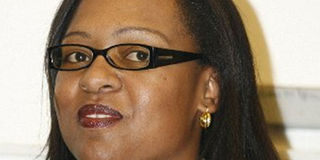Women shy away from Kenya's anti-graft job

Rose Mambo chairs the panel interviewing candidates for the Ethics and Anti-Corruption Commission (EACC). Photo/FILE
The public interviewing of candidates seeking top jobs has discouraged women from the positions, a special selection panel said on Monday.
This has in turn made it difficult to achieve the gender compliance rule for the Ethics and Anti-Corruption Commission (EACC), the panel mandated to identify candidates told journalists.
Panel chair Rose Mambo of the Association of Professional Societies of East Africa (APSEA) said that most women fear public scrutiny, terming it as “intrusive”, and as a result avoid applying for public service jobs which they are often fully qualified for.
This, she said, has called for the re-advertisement of the position of chairperson in the EACC since there were inadequate applications received from females to ensure compliance with the one-third gender representation rule of the Constitution.
She was speaking at the Public Service Commission (PSC) offices where she announced the re-advertisement and urged more women to apply to be chairperson.
“Qualified women are likely to have been discouraged by the tone and public nature of other recruitment processes, which has in some instances appeared to be intrusive.
“It is however a necessary process to ensure that candidates are fully vetted,” Ms Mambo said.
The implementation of the new Constitution has seen a big change in the recruitment of persons into key government jobs.
The exercise involves tedious interview processes that are often broadcast in the media.
Qualifications
The panel has so far received 21 applications for the post of chairperson, with only seven from women who are said to lack the requisite qualifications to be shortlisted for the job.
The names of three qualified applicants for chairperson are to be submitted to President Kibaki to nominate one in consultation with Prime Minister Raila Odinga.
New applicants have been given until November 1 to submit their applications.
To qualify for the position of chair, one has to hold a degree from a university recognised in Kenya, have a distinguished career, and have experience of not less than 15 years in various fields.
They also have to meet the requirements of Chapter Six of the Constitution which provides a standard on leadership and integrity.
The posts of chair and member of EACC were advertised in the local dailies on September 26, this year.
The panel received 164 applications for the position of member and has shortlisted 12 people for interviews slated for November 1 and 2 this year.
With the re-advertisement, interviews for the chairperson post will be held on the second week of November.
The selection panel has expressed its commitment to ensuring those shortlisted are highly qualified and capable people who would inspire confidence both locally and globally and also demonstrate Kenya’s commitment to fighting corruption.
Members include Levi Obonyo (Media Council of Kenya), the Reverend Dr Samuel Kobia (Judicial Service Commission), Sheila Kiambati (Office of the President), Caroli Omondi (Office of the Prime Minister), Tache Gollo (National Gender and Equality Commission), Charles Kanjama (Joint Forum, Religious Organisations), Florence Jaoko (Kenya National Commission for Human Rights) and John Tuta (Ministry of Justice, National Cohesion and Constitutional Affairs).




